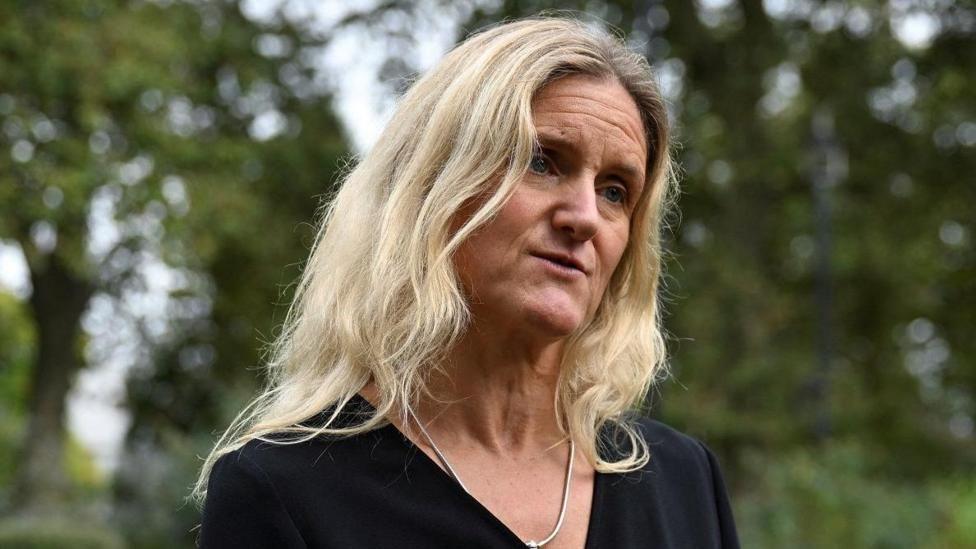Assisted dying 'expected to need Welsh vote'

- Published
Plans to legalise assisted dying will likely require a vote of politicians in the Welsh Parliament before they become law, two senior Labour backbenchers have told BBC Wales.
On Tuesday Labour MP Kim Leadbeater published proposals to make it legal for over-18s who are terminally ill to be given assistance to end their own life.
Former Welsh government legal advisor Mick Antoniw and ex-minister Julie Morgan said they expect there would need to be a vote on whether the Senedd gives its consent for the legislation.
The Senedd and some ministers rejected the broader principle of assisted dying back in October, after a debate tabled by Morgan.
Antoniw, who also supports the legislation, said he expected a "totally different debate", should the matter return.
The vote, which is yet to be confirmed as taking place, would not be legally binding but would be politically difficult for Labour MPs to ignore.
The Welsh government declined to give a view on whether a vote was needed on Tuesday, but said it was in "regular contact" with the UK government to understand the bill's implications.
Assisted dying bill: What is it and what's in proposed law?
- Published29 November 2024
The Senedd in Cardiff Bay, which is also known as the Welsh Parliament, has power over how Wales' health care service is run, but not the criminal law.
Leadbeater's bill covers England and Wales - and includes provisions for doctors, the Welsh government and Wales' chief medical officer.
It would require two independent doctors - and a judge - to verify whether the person satisfies the criteria to take their own life.
Leadbeater says it will ensure the strictest safeguards anywhere in the world.
Opponents have raised concerns that people could feel pressured into ending their own lives.
What could happen?
The UK Parliament is not banned from making laws that the Senedd normally has powers over, but the Senedd is usually asked to give its agreement if that happens.
It does this in a process called a legislative consent motion (LCM) - basically a vote on whether Members of the Senedd (MSs) agree that the UK Parliament can go ahead.
After last month's vote, it leaves open the possibility that the Senedd could reject the Leadbeater bill even if it is passed in the Commons.
It is not currently clear what would happen to the law if that happened, and whether it would need to be rewritten.
That is because the LCM system is not actually legally binding and has been ignored by Conservative UK governments in the past.
Westminster Labour, however, supports the principle the Senedd gives its consent to MPs' legislation in devolved areas, having promised to strengthen it at the last general election.
An initial debate and vote will take place in the Commons 29 November but the BBC was told a vote in the Senedd would come later.
The Welsh government said the LCM process would not be "engaged" until after the first stage of amending the bill in the Commons.
'More confidence'
Julie Morgan's motion calling for a new law to allow assisted dying was defeated in October by 26 against to 19 for - with nine abstentions.
It was not binding on the Welsh government and ministers were among those who voted against, including First Minister Eluned Morgan and Health Secretary Jeremy Miles.
Miles indicated in the debate that a further vote would likely be needed, and said the law would have "long reaching implications" for the health service.
The Cardiff North Labour MS said she expected there to be an LCM, and said the Westminster law is different to the motion debated in the Senedd which was much wider and included "incurable illness, causing unbearable suffering" which is not included in Leadbeater's proposed law.
"Obviously when the motion was rejected, it was on a slightly different motion.
"There was a lot of concern about a slippery slope. Kim Leadbeater's bill addresses that in being very specific. That might give more confidence to some people."
She said it was not clear what would happen if an LCM was rejected, and how the vote in the Commons will go.
"I think its essential there's a free vote," she said of the possible Senedd vote. "I'm sure that will happen again."

Kim Leadbeater says her bill would have the strictest safeguards on assisted dying in the world.
Former Welsh government counsel general Mick Antoniw told BBC Wales: "It certainly seems likely that as this will impact on the way that devolved services might be delivered in the future, it is a matter that will come back to the Senedd."
The Pontypridd Labour Member of the Senedd (MS) argued that the bill provides a "very restrictive interpretation of the circumstances assisted dying could take place".
He said it was a "totally different debate" to October's motion, and argued Senedd members would have the opportunity to influence Leadbeater's bill.
"This one would be [on whether], if legislation is going through, how would it impact on devolved functions."
The former counsel general said he would be surprised if Labour didn't give backbenchers a free vote.
One Senedd opponent of assisted dying legislation, Conservative Darren Millar, said: "The reality is that no matter how well intentioned and no matter what safeguards people may try to put in place, changing the law in this area will result in some people feeling pressure, whether real or perceived, to prematurely end their lives.
"Instead of facilitating premature deaths, governments across the UK should focus on addressing inconsistent access to effective palliative care that makes a real difference to the quality of life for people dealing towards the end of their lives."
A Welsh government spokesperson said: “We are in regular contact with the UK government regarding the private members assisted dying bill to understand and plan for any implications for Wales.”